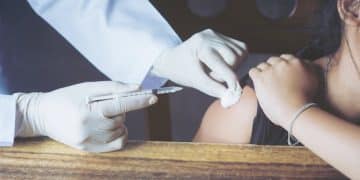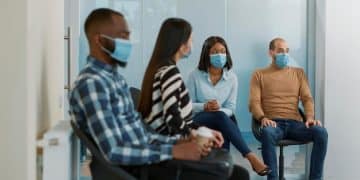New RSV Vaccine for Adults Over 60: What You Need to Know
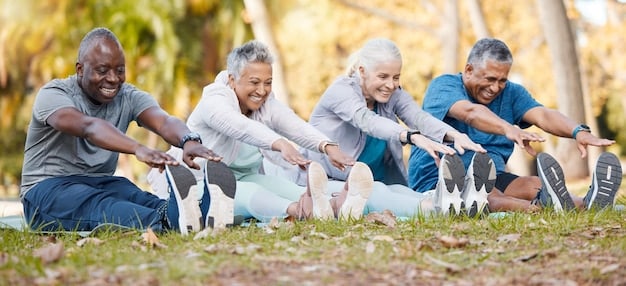
The new RSV vaccine for adults over 60 represents a significant advancement in preventive healthcare, offering robust protection against severe respiratory syncytial virus infections and reducing their associated health complications, particularly within this vulnerable demographic.
As we age, our immune systems naturally become less robust, leaving us more susceptible to common respiratory infections that can lead to severe complications. Among these, Respiratory Syncytial Virus (RSV) has long been a quiet but significant threat, particularly for older adults. If you are an older adult or care for one, understanding what you need to know about the new RSV vaccine for adults over 60 is crucial to protecting your health and well-being.
Understanding RSV: More Than Just a Winter Cold
RSV is a common respiratory virus that usually causes mild, cold-like symptoms. However, for certain populations, including infants, young children, and older adults, it can lead to serious and even life-threatening conditions such as bronchiolitis and pneumonia. For adults aged 60 and older, RSV infections can be particularly insidious, often mistaken for influenza or the common cold.
The impact of RSV on older adults extends beyond acute illness. It can exacerbate pre-existing conditions like asthma, chronic obstructive pulmonary disease (COPD), and congestive heart failure. The weakened immune response in this age group makes them less capable of fighting off the virus effectively, leading to prolonged illness, complications, and a higher risk of hospitalization or even death.
Who is at Highest Risk for Severe RSV?
While all older adults are susceptible to RSV, certain factors increase the risk of severe outcomes. These include:
- Advanced Age: The risk of severe illness increases with age, particularly for those over 75.
- Underlying Health Conditions: Individuals with chronic heart or lung disease, diabetes, or kidney failure are more vulnerable.
- Weakened Immune Systems: Those with compromised immune systems due to medical conditions (e.g., cancer, HIV) or immunosuppressive medications (e.g., long-term corticosteroids) face elevated risks.
- Residence in Long-Term Care Facilities: Living in group settings can increase exposure and transmission rates.
Recognizing these risk factors is the first step towards understanding the importance of preventive measures. The symptoms of RSV can overlap significantly with other respiratory viruses, making accurate diagnosis challenging without proper testing. Symptoms may include a runny nose, coughing, sneezing, fever, and wheezing. In more severe cases, shortness of breath, rapid shallow breathing, and bluish discoloration of the lips or skin may occur, signaling a medical emergency.
The burden of RSV on the healthcare system is substantial, often leading to increased emergency room visits and hospital admissions during peak seasons. Historically, treatment has been largely supportive, focusing on symptom management rather than targeting the virus itself. This highlights the urgent need for effective preventive strategies, chief among them being vaccination.
For years, the medical community grappled with the absence of a specific vaccine for RSV in adults. The focus was primarily on pediatric populations, where the virus is a leading cause of infant hospitalization. However, a growing understanding of RSV’s impact on older adults underscored the critical gap in public health protection. This shift in focus paved the way for groundbreaking research and the eventual development of adult RSV vaccines, marking a new era in respiratory virus prevention for seniors.
The Arrival of New RSV Vaccines: A Game Changer
The landscape of RSV prevention for adults over 60 has dramatically changed with the recent approval of new vaccines by regulatory bodies like the U.S. Food and Drug Administration (FDA). These vaccines represent a significant scientific achievement, offering specific protection against a virus that has long posed a silent threat. Two primary vaccines, Arexvy (by GSK) and Abrysvo (by Pfizer), have received approval, each with distinct features and mechanisms of action designed to elicit a robust immune response in older adults.
The development of these vaccines involved extensive clinical trials, demonstrating their safety and efficacy in preventing lower respiratory tract disease caused by RSV. These trials enrolled thousands of participants worldwide, providing high-quality data that supported their approval. The results consistently showed a significant reduction in the risk of symptomatic RSV disease, severe RSV, and even hospitalizations among vaccinated individuals compared to placebo groups.
How Do These Vaccines Work?
- Targeting the F Protein: Both Arexvy and Abrysvo target the prefusion form of the RSV fusion (F) protein. This protein is crucial for the virus to infect human cells. By generating antibodies against this specific protein, the vaccines help the immune system recognize and neutralize the virus before it can cause severe infection.
- Adjuvant (Arexvy): Arexvy contains an adjuvant, a substance that enhances the immune response to the vaccine. This adjuvant helps create a stronger and more durable protective immunity, which is particularly beneficial for older adults whose immune systems may not respond as robustly to vaccines.
- No Adjuvant (Abrysvo): Abrysvo achieves its effectiveness without an adjuvant, relying on its specific protein structure to induce a protective immune response. Its formulation is also approved for use in pregnant individuals to protect newborns, showcasing its versatile application.
The approval of these vaccines is a monumental step forward, providing older adults with a proactive tool to safeguard their respiratory health. Prior to these vaccines, preventive measures were limited to non-pharmacological interventions like hand hygiene and avoiding sick individuals. While important, these measures alone were insufficient to combat the widespread nature of RSV.
The scientific breakthrough lies in their ability to stimulate a targeted immune response that older adults can mount effectively. This translates to substantial reductions in the burden of RSV-related illness, which previously placed enormous strain on individuals, their families, and healthcare systems. The very availability of these vaccines signals a new era of proactive public health strategies addressing a previously unaddressed major respiratory pathogen in the elderly.
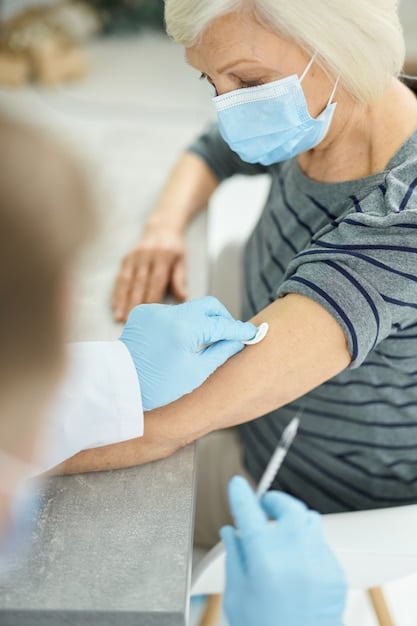
Who Should Get Vaccinated? Eligibility and Recommendations
Understanding who should receive the new RSV vaccine is paramount for maximizing its public health impact. The primary target population for these newly approved vaccines are adults aged 60 and older. However, within this broad category, specific recommendations guide who should prioritize vaccination.
The Centers for Disease Control and Prevention (CDC) and its Advisory Committee on Immunization Practices (ACIP) play a crucial role in providing these guidelines. Their recommendations are based on extensive data from clinical trials, considering vaccine efficacy, safety, and the burden of RSV disease in different age groups and risk categories.
CDC and ACIP Recommendations
For adults aged 60 and older, the CDC and ACIP recommend a shared clinical decision-making process. This means that the decision to get vaccinated should be made in consultation with a healthcare provider, taking into account the individual’s health status, risk factors, and personal preferences. While the vaccine is generally recommended for all adults in this age group, particular emphasis is placed on:
- Individuals with Chronic Health Conditions: Those with underlying medical conditions such as chronic lung disease (e.g., COPD, asthma), chronic heart disease (e.g., congestive heart failure), diabetes, kidney disease, or neurological conditions are at higher risk of severe RSV and should strongly consider vaccination.
- Residents of Nursing Homes and Long-Term Care Facilities: These individuals live in close quarters, increasing their risk of exposure and transmission, making vaccination particularly important.
- Immunocompromised Individuals: People with weakened immune systems due to disease (e.g., cancer, HIV) or immunosuppressive medications (e.g., post-transplant patients) are highly vulnerable and should discuss vaccination with their doctor.
It’s important to have an open dialogue with your healthcare provider about whether the RSV vaccine is right for you. They can assess your individual risk profile, discuss any potential contraindications, and help you make an informed decision. This personalized approach ensures that the vaccine is administered to those who will benefit most from it, while also addressing any specific health concerns. Factors they may consider include your overall health, any medications you are taking, and your history of acute or chronic illnesses.
The vaccine is typically administered as a single dose. The timing of vaccination often aligns with the typical RSV season, which usually runs from late fall through early spring. Getting vaccinated before the start of the season can help ensure you have protective immunity when the virus is most prevalent in the community. However, vaccination can be administered at any time of the year once recommended.
As with all new vaccines, ongoing surveillance and data collection will continue to refine these recommendations, ensuring they remain updated and reflective of the latest scientific evidence and real-world vaccine effectiveness. This commitment to continuous evaluation ensures optimal public health outcomes and provides confidence in vaccine safety and efficacy.
Expected Benefits and Efficacy
The introduction of the new RSV vaccines for adults over 60 marks a pivotal moment in public health, promising substantial benefits in protecting a vulnerable population. The efficacy data from clinical trials have been overwhelmingly positive, demonstrating the vaccines’ ability to significantly reduce the burden of RSV-related illness. These benefits extend beyond just preventing symptomatic disease, encompassing reductions in severe outcomes, hospitalizations, and overall healthcare utilization.
Clinical trials for both Arexvy and Abrysvo showed impressive efficacy rates. For Arexvy, studies indicated a high efficacy in preventing RSV-associated lower respiratory tract disease (LRTD) and severe LRTD. Specifically, it was shown to be over 80% effective in preventing severe RSV-LRTD and around 70-80% effective against general RSV-LRTD in adults 60 years and older. Abrysvo also demonstrated comparable efficacy, with studies showing similar reductions in the risk of RSV-LRTD and severe outcomes.
Key Benefits of RSV Vaccination
- Reduced Risk of Severe Disease: The most critical benefit is the significant reduction in the risk of developing severe RSV, which often leads to hospitalization. This can alleviate pressure on healthcare systems, especially during peak respiratory virus seasons.
- Prevention of Hospitalization: By preventing severe illness, the vaccines directly contribute to fewer hospital admissions, allowing older adults to remain healthier and more independent.
- Decreased Mortality: While direct mortality reduction data is still accumulating, preventing severe disease and hospitalization is expected to lead to a decrease in RSV-related deaths in the long term.
- Protection Against Exacerbations of Chronic Conditions: For individuals with chronic heart or lung diseases, RSV can trigger severe exacerbations. Vaccination can offer a layer of protection against these dangerous flare-ups.
- Improved Quality of Life: By preventing illness and its complications, the vaccine helps maintain the quality of life for older adults, allowing them to remain active and engaged in their communities.
The protection offered by these vaccines appears to be durable, extending through at least one full RSV season. Ongoing studies are continuing to monitor the longevity of the immune response and the need for potential booster doses in the future. This long-term protection is crucial for older adults, who often face health challenges that can make frequent vaccination difficult or less impactful.
Beyond individual health, the widespread adoption of RSV vaccination among older adults could have broader public health implications. By reducing the overall incidence of RSV, there could be a decrease in community transmission, indirectly protecting those who cannot be vaccinated, such as very young infants who are too young for the vaccine. This concept, known as herd immunity, contributes to a healthier community overall.
The economic impact of RSV is also significant, with substantial costs associated with hospitalizations, emergency room visits, and long-term care for severe cases. By preventing these outcomes, the RSV vaccine has the potential to generate considerable healthcare cost savings. These benefits underscore why global health organizations and public health authorities are so invested in promoting adult RSV vaccination as a key component of seasonal respiratory virus protection alongside influenza and COVID-19 vaccines.
Potential Side Effects and Safety Profile
Like all vaccines, the new RSV vaccines for adults over 60 undergo rigorous testing to ensure their safety and efficacy before widespread approval. While highly effective, it’s important for individuals to be aware of the potential side effects, which are generally mild and temporary. Understanding the safety profile of these vaccines is crucial for informed decision-making and managing expectations post-vaccination.
The clinical trials for both Arexvy and Abrysvo included thousands of participants, carefully monitoring for any adverse events. The vast majority of reported side effects were mild to moderate and resolved within a few days. These are common reactions to vaccines, indicating that the immune system is responding and building protection against the virus.
Common Side Effects
- Injection Site Reactions: These are the most frequently reported side effects and include pain, redness, and swelling at the site where the shot was given. These reactions are typically mild and go away on their own within a day or two.
- Systemic Reactions: Some individuals may experience more generalized symptoms, such as fatigue, muscle aches, headache, and joint pain. Fever and nausea are less common but can occur. These systemic reactions are usually mild and resolve quickly.
Serious adverse events following RSV vaccination are rare, similar to what is observed with other vaccines. Regulatory agencies like the FDA and health organizations like the CDC continue to monitor the safety of these vaccines through post-marketing surveillance programs. This ongoing monitoring helps detect any rare or previously unrecognized side effects as the vaccines are distributed to a larger population.
It’s important to remember that the benefits of protection against a potentially severe RSV infection significantly outweigh the risks of these mild, temporary side effects. RSV can lead to serious complications in older adults, including pneumonia, exacerbation of chronic heart and lung conditions, hospitalization, and even death. The discomfort of a sore arm or temporary fatigue is a small price to pay for substantial protection against such risks.
Individuals with a history of severe allergic reactions to any component of the vaccine should discuss this with their healthcare provider before vaccination. As with any medical procedure, an open conversation with your doctor or pharmacist about your medical history and any concerns you may have is highly recommended. They can provide personalized advice and ensure the vaccine is appropriate for your specific health circumstances.
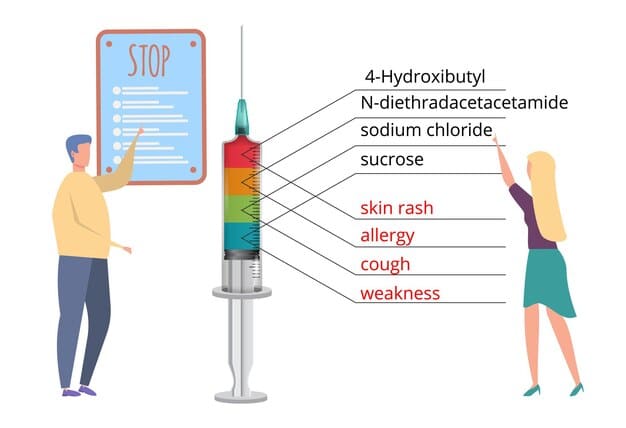
The safety data collected to date strongly supports the use of these RSV vaccines in older adults. Their introduction represents a robust addition to the preventive health arsenal, offering a proven method to reduce the burden of RSV with a well-established and acceptable safety profile. Continuous monitoring will ensure that any new information is promptly communicated to the public and healthcare providers, maintaining transparency and trust in vaccine safety.
Administering the Vaccine: What to Expect at the Clinic
Getting your RSV vaccine is a straightforward process, similar to receiving a flu shot or other routine immunizations. Knowing what to expect before, during, and after your appointment can help alleviate any concerns and ensure a smooth experience. The vaccine is typically administered in a healthcare setting, such as a doctor’s office, pharmacy, or community health clinic.
Before your appointment, it’s a good idea to confirm your eligibility and whether your healthcare provider or pharmacy offers the RSV vaccine. Some clinics may require appointments, while others may offer walk-in services. It’s also wise to bring your insurance card, as most insurance plans, including Medicare Part D, are expected to cover the cost of the vaccine under the Affordable Care Act’s preventive services provisions without patient cost-sharing.
During Your Vaccination Appointment
- Consultation: A healthcare professional will likely discuss your medical history, any allergies you have, and answer any questions about the vaccine. This is an opportunity to clarify any concerns.
- Injection: The vaccine is administered as a single dose via an intramuscular injection, typically into the upper arm. The process is quick, usually taking only a few seconds. The healthcare provider will clean the injection site before administering the shot.
- Observation: After receiving the vaccine, you may be asked to remain at the clinic for 15-20 minutes. This is a standard safety precaution for all vaccines, allowing medical staff to monitor for any immediate allergic reactions, though these are rare.
Many individuals find the injection itself to be quick, causing only a brief pinch or sting. The healthcare provider will ensure you are comfortable throughout the process. Don’t hesitate to communicate any anxieties or discomfort you may experience. They are there to provide a supportive and professional environment.
After your observation period, you can typically go about your day as usual. You might experience the mild side effects discussed earlier, such as soreness, redness, or swelling at the injection site, or general symptoms like fatigue or headache. These are normal signs that your body is building protection and typically resolve within one to two days. Over-the-counter pain relievers, such as ibuprofen or acetaminophen, can help manage any discomfort. Applying a cool compress to the injection site may also provide relief.
It’s important to keep track of your vaccination record, just as you would for other important immunizations. This record is vital for your personal health history and can be useful for future healthcare needs. Many healthcare systems and pharmacies offer digital records or vaccination cards for this purpose.
The process is designed to be as convenient and safe as possible, encouraging wide uptake among eligible older adults. Access to these vaccines is continually improving, with pharmacies and primary care providers playing a key role in their distribution. Ensuring you know where and how to get vaccinated is your next step in utilizing this important protective measure.
Integrating RSV Vaccination into Your Health Regimen
The arrival of the new RSV vaccines presents an important opportunity to bolster your overall health regimen, particularly for adults over 60. Integrating this vaccine into your annual preventive care strategy, alongside other recommended immunizations, is key to comprehensive protection against respiratory illnesses. Proactive prevention is always more effective than reactive treatment, especially when it comes to infectious diseases.
For most older adults, an annual health check-up is a standard part of their preventative care. This is an ideal time to discuss the RSV vaccine with your doctor. They can provide personalized advice based on your health history, current medications, and overall risk factors. Your physician can also help you understand how the RSV vaccine fits in with your other vaccinations, such as the flu shot and COVID-19 boosters, ensuring proper timing and spacing between doses when necessary.
Key Considerations for Integration
- Annual vs. One-Time: While current data suggests durable protection through at least one season, ongoing research will determine if annual RSV vaccination is needed, similar to the flu shot, or if it will be a less frequent vaccine. Your healthcare provider will have the most up-to-date guidance.
- Co-administration: Discussion with your healthcare provider will confirm whether the RSV vaccine can be safely administered at the same time as other vaccines like the flu or COVID-19 vaccine. Simultaneous administration can be convenient and help improve vaccination rates.
- Awareness of RSV Season: Understand that RSV typically peaks in late fall and winter months. Aiming to get vaccinated before the season starts can provide optimal protection when the virus is most prevalent in your community.
Beyond vaccination, maintaining a robust health regimen includes several other crucial elements. Regular exercise, a balanced diet, adequate sleep, and stress management all contribute to a stronger immune system, making your body more resilient against infections. These foundational health practices complement the protection offered by vaccines, creating a comprehensive shield against pathogens.
Staying informed about public health recommendations is also essential. Reliable sources like the CDC, World Health Organization (WHO), and your local health department provide up-to-date information on vaccine availability, new guidelines, and disease prevalence. Subscribing to newsletters from reputable health organizations or regularly checking their websites can help you stay current.
Finally, open communication with your family and caregivers about your vaccination status and health needs is important. They can support your preventive health efforts and assist if you experience any mild side effects or require help accessing vaccination sites. Collective awareness and action within a household or community can enhance protection for everyone, particularly the most vulnerable members.
By diligently integrating the new RSV vaccine into your health routine, you’re not just protecting yourself; you’re contributing to the overall health and resilience of your community. This proactive approach to health management empowers older adults to live fuller, healthier lives, minimizing the threats posed by preventable respiratory illnesses and staying actively engaged with their lives.
| Key Point | Brief Description |
|---|---|
| 👴 Significance for Seniors | RSV can cause severe illness, hospitalization, and death in adults aged 60+, especially those with chronic conditions. |
| 🔬 New Vaccine Approvals | FDA-approved vaccines (Arexvy, Abrysvo) target the RSV F protein, offering strong protection. |
| ✅ Efficacy & Benefits | Studies show high efficacy in preventing severe RSV, reducing hospitalizations, and improving overall health. |
| 💉 Safety & Side Effects | Generally mild and temporary side effects (sore arm, fatigue). Serious reactions are rare. |
Frequently Asked Questions About the New RSV Vaccine
▼
The CDC recommends the new RSV vaccine for adults aged 60 and older, particularly those with underlying health conditions such as chronic heart or lung disease, diabetes, or weakened immune systems. The decision should be made in consultation with a healthcare provider to assess individual risk factors and benefits.
▼
Yes, currently two RSV vaccines are approved for adults over 60 in the U.S.: Arexvy (by GSK) and Abrysvo (by Pfizer). Both target the RSV fusion (F) protein but differ in formulation; Arexvy uses an adjuvant, while Abrysvo does not. Your doctor can help determine which is suitable for you.
▼
Common side effects are generally mild and temporary, including pain, redness, or swelling at the injection site. Some individuals may experience fatigue, muscle aches, headache, or joint pain. Serious side effects are rare, and these symptoms typically resolve within one to two days.
▼
Clinical trials have shown high efficacy. For example, Arexvy was over 80% effective in preventing severe RSV-associated lower respiratory tract disease in adults aged 60 and older. Both vaccines significantly reduce the risk of physician-attended illness, hospitalization, and severe outcomes associated with RSV infection.
▼
While studies are ongoing regarding co-administration, a healthcare provider can advise on the appropriate timing if you wish to receive the RSV vaccine alongside your annual flu shot or COVID-19 booster. It’s generally safe to receive multiple vaccines, but consultation ensures optimal protection and comfort.
Conclusion
The introduction of the new RSV vaccines for adults over 60 represents a landmark achievement in public health, offering a critical layer of protection against a virus that has long posed a significant, yet often underestimated, threat to older populations. By understanding the risks associated with RSV, recognizing the profound efficacy and safety profile of these new vaccines, and embracing this preventive measure, older adults can significantly reduce their risk of severe illness, hospitalization, and associated complications. Consulting with your healthcare provider to discuss eligibility and integrate the RSV vaccine into your comprehensive health regimen is a proactive step towards a healthier, more resilient future, ensuring that the golden years can be lived to their fullest, free from the shadow of serious respiratory disease.
